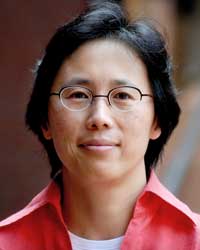Linguistics (MA)
The one-year master’s in Linguistics is concerned with the knowledge, structure and use of language, studied from a wide range of perspectives. It trains students to systematically identify, describe and analyse language phenomena and to apply this knowledge to a specific area of interest.
Specialisations
Why study Linguistics at Leiden University?
Studying at Leiden University allows you to explore the field of linguistics through your own interests. This could be wanting to study a specific language, sheer analytical curiosity, theoretical interest or the ambition to become a translator. You can achieve your ambitions by following one of our specialisations, or you can create your own track according to your individual interests.
The Master's programme in Linguistics at Leiden University offers a wide range of perspectives on language. It enables you to learn how to identify, describe and analyse language phenomena systematically and to apply this knowledge to a specific area of interest, ranging from theoretical and experimental approaches to language learning and translation, and more.
What are your career prospects?
This Master's prepares you to be a language expert who is sought-after in various sectors of the job market. Our graduates work at different types of organisations, such as education, academia, research institutes, and communication and marketing. Jobs include translator, consultant, linguist and PhD candidate.
Is Linguistics the programme for you?
Are you intrigued by the inner workings of language? Do you want to uncover these mechanisms through a wide range of linguistic perspectives and methods? Then Linguistics at Leiden University is the right Master's programme for you. Find out if you are eligible for this Master's programme by checking the admission requirements.
Check the admission requirements

From Azerbaijani to Swedish: ‘Multilingualism improves your understanding of others’
There are 24 official languages in Europe but some 200 languages in total are spoken on our continent. What good are all these different languages? And should we all learn Azerbaijani or Swedish? We asked Lisa Cheng, Professor of General Linguistics. Read more.

